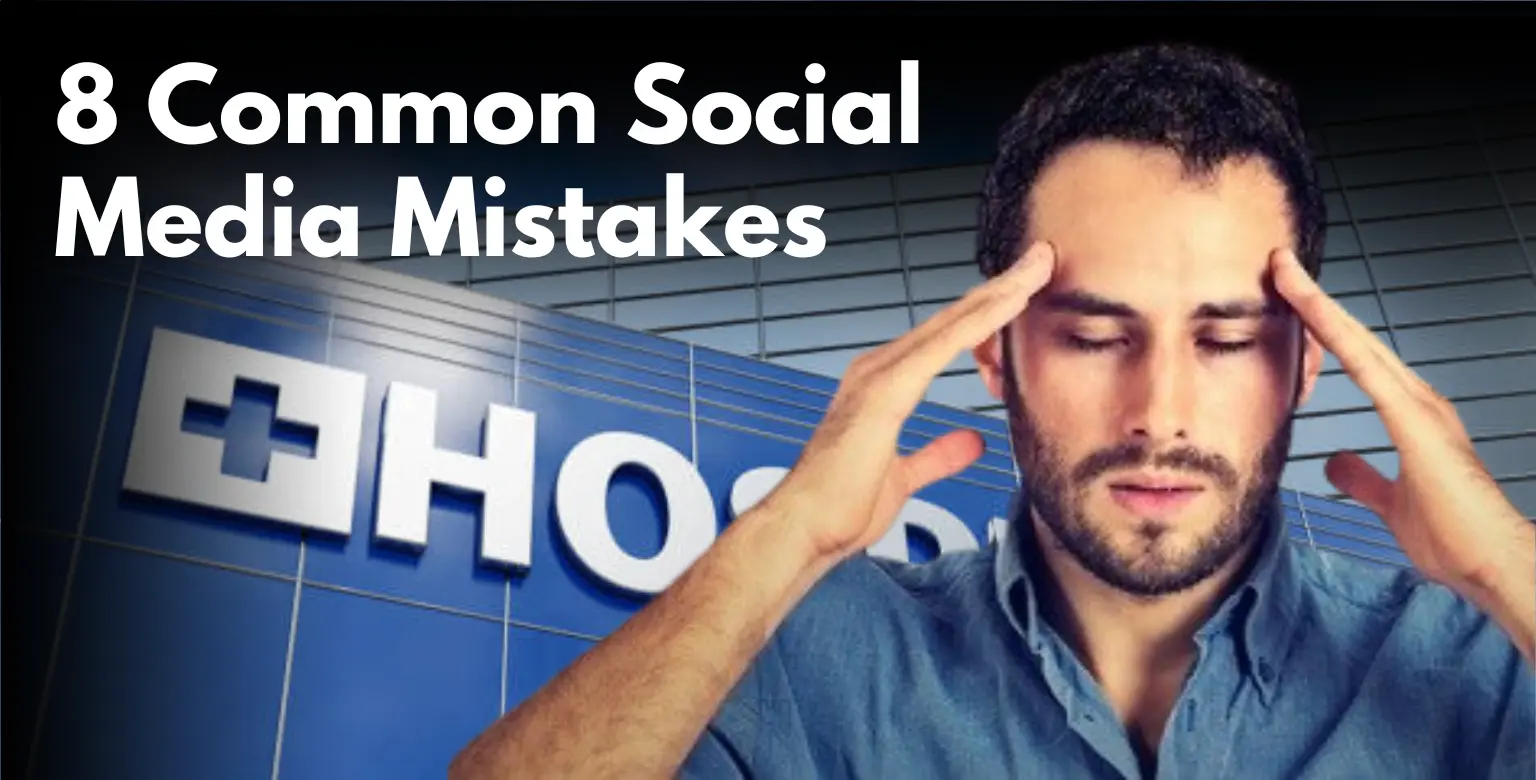
Social media has come a long way, helping industries like healthcare with branding and promotion. From connecting healthcare professionals with patients to promoting health awareness in society, social media contributes a lot. Though several health industry professionals have mastered social media, there are still many individuals in the industry who barely have the ideas to make social media work for them. As a result, many talented doctors, therapists, and health physicians are missing out on the industry. To help them grow in this ever-evolving medical fraternity, here we have highlighted some common social media mistakes doctors make while building an online reputation.
8 Social Media Mistakes To Avoid While Building Your Brand
Social media is a continuous process of communication where you broadly interact with people over the internet. Without a planned, committed interaction process, you can fail in reputation management, limiting your opportunities in the healthcare industry. Keeping these following 8 ‘don’ts ‘ in mind, you can be more formal and interactive with your patient community.
1. Not Having a Clear Social Media Strategy
A good start guarantees a smooth end, and nothing beats strategy drafting when it comes to a good start. There are several healthcare professionals who get online daily, but due to improper planning and a roadmap, they fail to create an effective first impression. However, developing a clear social media roadmap can counter this issue, helping you generate better first impressions throughout all platforms.
A clear roadmap can make you more prompt, impactful, and resonant over social media and attract more healthcare audiences. Moreover, you will be easily visible to your clients, helping you grow your reputation in the industry.
2. Sharing Misinformation or Unverified Content
One of the biggest common social media mistakes doctors and healthcare professionals commit is spreading misinformation. Doesn’t matter if it was intentional or unintentional; spreading wrong information can heavily backfire on you while promoting your online reputation in the opposite direction. So while communicating with your audience over social media, make sure the information is legit and approved by the medical fraternity.
When it comes to health issues, people invest their 100% faith in doctors. And being responsible for one’s health, you must be very careful while conveying information. In this matter, cross-check details, consult and ask for opinions from other medical professionals, and go ahead.
3. Neglecting Patient Confidentiality
People, especially in India, are still taboo about their health issues. Treatment for certain conditions usually gets delayed because people don’t open up about their health issues. Standing in this scenario, neglecting the privacy of your patient while being vocal on social media is a big no. Moreover, social media is all about creating patient engagement. So use it to promote health awareness and how your treatment is helping people, rather than discussing the core part of the medical condition and patients suffering. If a case is really worth reaching out to social media, then make sure you have the consent of the patient to proceed further.
4. Over-Promoting Services Instead of Educating
Over-promoting is another simplistic and most common social media mistakes doctors make while influencing the healthcare industry. After years of acting as a medium for online communication, social media is now also a vital tool for marketing and promotion. Despite that, social interaction and friendly communication still remain the essence of these social media platforms. So making your social media content too promotional can diminish your reputation and trustworthiness, especially in the healthcare industry.
Make sure your posts and interactions are not too promotional and prioritize your clinic. Neither should it emphasize creating competition in the medical fraternity. Rather, your social handle should portray you as prompt medical support and how some precautions can help keep the society healthy.
5. Ignoring Audience Engagement and Feedback
Understandably, doctors and healthcare professionals don’t always get enough time to perform other functions, but it is always recommended to prioritize interacting with the audience when dealing with social media marketing. Prompt interaction through comments and replies can create a sense of credibility and trust among the patient community.
When consumers feel heard, they are more inclined to interact with future information and see the expert as accessible. A simple reaction might help to improve your internet reputation and relationships. To manage this more effectively, physicians may employ automatic answers to frequently asked queries, appoint a staff member to handle contacts, or set aside a few minutes each day for responses. Little, continuous effort leads to a more engaging and trustworthy web presence.
6. Posting Inconsistently or Abandoning Accounts
While many physicians engage on social media, others tend to fade away, which could negatively impact their reputation management efforts. Keeping your social media handle inactive not only will bring a bad reputation on you but will also degrade your confidence over social media. Besides, a profile without proper information can confuse prospective patients. To avoid this, one of the common social media mistakes doctors make while keeping a steady online presence is increasing the frequency of content. You can also keep your content prepared, which can not only ensure flexibility but also save you enough time. A robust social media presence fosters trust and maintains engagement in the healthcare sector.
7. Engaging in Online Arguments or Controversial Topics
Doctors and other healthcare practitioners should avoid getting involved in heated discussions. It is vital to support science-based medicine, yet it is perilous to allow one’s emotions to take over while responding to criticism. When individuals dispute, their anger and resentment may grow into unnecessary hostility. Professionals should maintain their composure, embody honesty, and exhibit courtesy consistently. The most effective way to address misleading information is to offer straightforward, precise comments. Rather than escalating tensions, it’s better to step back from an unproductive discussion. Upholding professionalism online protects credibility and fosters a respectful and reliable presence within the medical community.
8. Not Monitoring Online Reputation
The last and one of the most common social media mistakes doctors make is not monitoring online reputation. What other people say about you as a doctor online might have an influence on your reputation. Some professionals don’t bother to read online reviews. Their reputation may suffer if they ignore unfavorable feedback, false allegations, or misleading information. Social media monitoring services and Google Alerts are two tools that may help people keep track of their online reputation. Responding to issues appropriately and encouraging pleased customers to provide good reviews may assist in keeping the playing field level online.
Conclusion
Social media offers incredible opportunities for healthcare professionals to educate, connect, and grow their practice. However, misusing it can lead to ethical breaches, reputation damage, or ineffective communication. By avoiding these common social media mistakes doctors and adopting a thoughtful, strategic approach, doctors can enhance their online presence while maintaining professionalism and trust.
Staying informed about social media best practices and engaging responsibly ensures that healthcare professionals can harness the full potential of digital platforms without jeopardizing their credibility. In case you have your entire time dedicated to the healthcare world, you can hire us to get your social media professionally optimized and managed with ultimate care. Contact us through our website (webeesystems.com) or you can directly call and mail us through the following credentials: info@webeesystems.com, +91 91477 04138.




